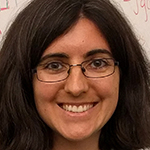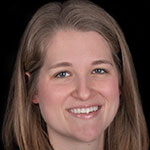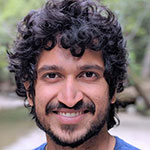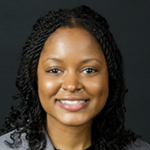2021 COPSS Award Winners
Quick Links
Leadership Academy Winners
Wing Hung Wong to Deliver 2021 COPSS Distinguished Lecture
Alicia Carriquiry to Deliver 2021 F.N. David Lecture
David Dunson Named George W. Snedecor Award Winner
Leadership Academy Winners
The Committee of Presidents of Statistical Societies (COPSS) presents awards annually to honor statisticians who have made outstanding contributions to the profession. For 2021, the new leadership academy winners have been selected in addition to the Distinguished Lecture, the F.N. David Lecture, and the Snedecor. All of the awards will be presented at the Joint Statistical Meetings by COPSS Chair Bhramar Mukherjee and the award committee members.
 Emma Benn
Emma Benn
Associate Professor
Department of Population Health Science and Policy Icahn School of Medicine at Mount Sinai
For unmatched dedication to increasing diversity in the statistical sciences; for outstanding contributions to health disparities research; and for significant contributions to educating the next generation of clinical and statistical scientists.
 Claire Bowen
Claire Bowen
Lead Data Scientist Privacy and Security
Urban Institute
For contributions to the development and broad dissemination of statistics and data science methods and concepts, particularly in the emerging field of data privacy, and for leadership of technical initiatives, professional development activities, and educational programs.
 Tamara Broderick
Tamara Broderick
Associate Professor
Department of Electrical Engineering
and Computer Science
MIT
For significant contributions to Bayesian nonparametrics and machine learning.
 Jeff Goldsmith
Jeff Goldsmith
Associate Professor
Department of Biostatistics
Columbia University Mailman School of Public Health
For exemplary leadership in teaching and training students in biostatistics, data science, and public health.
 Stephanie Hicks
Stephanie Hicks
Assistant Professor
Department of Biostatistics
Johns Hopkins Bloomberg School of Public Health
For notable contributions to the analysis of high-throughput and single cell methods and data analysis and for significant educational, mentoring, and outreach efforts to expand and diversify the community of data scientists.
 Jonas Peters
Jonas Peters
Professor of Statistics
University of Copenhagen
For path-breaking contributions to statistical issues in connection with causality research; for an extraordinary active role
in research dissemination; and for outstanding inspiration of junior researchers.
 Aaditya Ramdas
Aaditya Ramdas
Assistant Professor
Department of Statistics and Data Science
Carnegie Mellon University Machine Learning Department
For significant contributions to sequential nonparametric inference, uncertainty quantification in machine learning, and statistical methods for reproducibility, as well as the development of an array of unique courses and tutorials, along with extensive mentorship and outreach activities.
 Alisa Stephens-Shields
Alisa Stephens-Shields
Assistant Professor of Biostatistics
Department of Biostatistics, Epidemiology, and Informatics
University of Pennsylvania of Medicine
For exemplary leadership in interdisciplinary collaboration; for contributions to education in causal inference; and for dedicated effort to increasing the pipeline of talented students into the profession.
 Lingzhou Xue
Lingzhou Xue
Associate Professor of Statistics
Department of Statistics
The Pennsylvania State University
For his innovative contributions to the theory and methodology of high-dimensional statistics and statistical learning and for his outstanding and prolific service to the profession and to society.
Wing Hung Wong to Deliver 2021 COPSS Distinguished Lecture
Daniela Witten, Award Committee Chair
COPSS has selected Wing Hung Wong to be the recipient of the 2021 COPSS Distinguished Achievement Award and Lectureship (DAAL).
Wong serves on the faculty of Stanford University, where he is professor of statistics, professor of biomedical data science, and holder of the Stephen R. Pierce Family Goldman Sachs Professorship in Science and Human Health. Before joining Stanford in 2004, he held teaching positions at The University of Chicago, The Chinese University of Hong Kong, University of California at Los Angeles, and Harvard University. He chaired the Stanford Department of Statistics from 2009–2012.
Wong’s research contributions include mathematical statistics, where he clarified the large sample properties of sieve maximum likelihood estimates in general spaces; Bayesian statistics, where he introduced sampling-based algorithms into Bayesian computational inference; and computational biology, where he developed tools for the analysis of microarrays and sequencing data and applied them to study gene regulatory systems.
In 1993, Wong won the COPSS Presidents’ Award. He was elected to the National Academy of Sciences in 2009 and Academia Sinica in 2010. He was a founding member of the Hong Kong Academy of Sciences in 2015.
As the recipient of the 2021 COPSS DAAL, Wong will give a talk at the 2021 Joint Statistical Meetings, “Understanding Human Trait Variation from the Gene Regulatory Systems Perspective.” Genome-wide association studies have shown success in identifying genetic loci relevant to a number of human traits such as disease susceptibility and anthropometric features. However, such direct statistical associations provide limited information about the underlying biological processes relevant to the trait.
Wong will argue that the integration of gene regulatory information is critical to achieving a better understanding of these genotype-phenotype relations. He will review research by his lab and others on the inference of context-specific gene regulatory relations based on bulk or single cell data from diverse cell types, tissue types, and developmental contexts. He will also describe his lab’s ongoing efforts to exploit this information to build multilayer statistical models capable of providing a more mechanistic understanding of human trait variation.
Alicia Carriquiry to Deliver 2021 F.N. David Lecture
Nancy Gordon, Award Committee Chair, and Daniel Nettleton, Iowa State University
COPSS has selected Alicia Carriquiry, President’s Chair in Statistics at Iowa State University, to be the 2021 COPSS Florence Nightingale David Award and Lectureship winner. Carriquiry will receive the award during the 2021 Joint Statistical Meetings, where she will also deliver the F.N. David Lecture, “Statistics in the Pursuit of Justice: A More Principled Strategy to Analyze Forensic Evidence.”
The F.N. David Award, sponsored jointly by COPSS and the Caucus for Women in Statistics, recognizes Carriquiry for her contributions to the profession that have spanned more than 30 years.
Carriquiry researches applications of statistics in human nutrition, bioinformatics, forensic science, and traffic safety and has published more than 140 peer-reviewed articles in academic journals. She has worked with various government and health agencies around the world to improve health and nutrition, including the National Center for Health Statistics, National Institutes of Health, European Union, and World Health Organization.
For the past six years, Carriquiry has been the director of the Center for Statistics and Applications in Forensic Evidence (CSAFE), a National Institute of Standards and Technology (NIST) Center for Excellence. With more than 80 researchers from across six universities, CSAFE is developing statistically sound and scientifically solid methods to analyze and interpret evidence, providing the forensic community with accessible tools, open-source databases, and educational opportunities.
Carriquiry has published cutting-edge work on source matching for bullet markings, glass fragments, footwear impressions, and handwriting analysis. Her work potentially could have a significant and beneficial impact on the US criminal justice system.
Carriquiry earned a master’s degree in animal science from the University of Illinois and a master’s and doctorate in statistics and animal genetics from Iowa State University. She joined the Iowa State faculty in 1990 and has held various leadership roles at the university.
As the first female faculty member promoted to full professor in the department of statistics at Iowa State University, Carriquiry continues to advocate for female and early-career faculty by providing them with opportunities for success. The department now has 15 other female faculty members who have benefited from the path Carriquiry blazed and her subsequent advocacy and support.
Carriquiry is a fellow of several statistical associations, including the American Statistical Association, International Statistical Institute, Institute of Mathematical Statistics, and International Society for Bayesian Analysis. She is an elected member of the National Academy of Medicine and a fellow of the American Association for the Advancement of Science.
She joined the Intelligence Science and Technology Experts Group of the National Academies of Sciences, Engineering, and Medicine. In 2018, Carriquiry became a technical adviser for the Association of Firearm and Tool Mark Examiners and, in 2020, was elected an associate member of the American Academy of Forensic Sciences.
David Dunson Named George W. Snedecor Award Winner
Kerrie Mengersen, Award Committee Chair, and Sudipto Banerjee, University of California at Los Angeles
COPSS has selected David B. Dunson, arts and sciences distinguished professor in the department of statistical sciences at Duke University, to be the recipient of the 2021 George W. Snedecor Award.
The G.W. Snedecor award, established in 1976, honors an individual who was instrumental in the development of statistical theory in biometry and recognizes a noteworthy publication within three years of the date of the award. The award, given biennially (odd years) since 1991, consists of a plaque and cash honorarium of $2,000 and is presented at the Joint Statistical Meetings.
The recognized publication is the following:
Miller, J.W., and D.B. Dunson. 2019. Robust Bayesian inference via coarsening. Journal of the American Statistical Association 114:1113–1125.
Dunson has maintained an astounding research portfolio throughout his career, with more than 400 peer-reviewed scholarly manuscripts appearing in leading journals. He is also a co-author on a leading textbook on Bayesian statistical science. Interpreting the field of biometry in the broader sense as that of quantitative methods in biological and health sciences, about 120 of Dunson’s papers in the top echelon of journals in our profession have been directly instrumental in advancing statistical theory related to biometry. His scholarly manuscripts, without exception, tackle the many challenging curiosities in modern science by developing theoretically rigorous statistical frameworks, stochastic process models, and computational algorithms for the complex and high-dimensional data generated in scientific laboratories across a variety of scientific disciplines.
In the recognized publication, Miller and Dunson offer an innovative and fundamentally different approach to Bayesian inference based on the idea of “coarsening” and referred to as “c-Bayes.” Briefly, rather than conducting inference based on the usual posterior distribution of the parameter’s conditional on the event the data has been generated from a posited model, c-Bayes conditions on the model-generated data being a sufficiently close approximation to the observed data. Miller and Dunson’s c-Bayes approach has proven particularly potent in consolidating robustness of inference against perturbations from misspecified and dubious modeling assumptions. The manuscript adeptly elucidates the underlying theoretical issues surrounding bias, calibration, measurement error, over-dispersion, and over-fitting. Miller and Dunson offer impressive novelty in theory, methods, and computation.
A particularly appealing example in biometry presented in the paper applies c-Bayes for robust clustering in flow cytometry—a high-throughput technology for detecting and measuring physical and chemical characteristics of a population of cells or particles. Traditionally, this clustering is performed manually by defining piecewise linear boundaries between regions using one of several automated clustering algorithms. One key challenge here is that the populations are not well-approximated by any parametric distribution and the number of populations is not known in advance. Miller and Dunson demonstrate the substantial inferential advantages of c-Bayes over nonparametric Bayesian models such as mixtures of Gaussian distributions and other alternatives.
It is worth pointing out that the manuscript has garnered close to 100 citations in the two years since its publication. This is a remarkable achievement for an article focusing on statistical theory and methods and is a further testament to the impact and relevance of this research. Several papers primarily authored by biologists and scientists engaged in a variety of data-intensive health-oriented research are also taking note of c-Bayes.
Based on Dunson’s overall career contributions to the advancement of statistical theory in biometry and, more specifically, his stimulating and highly innovative research manuscript, the conferral of the 2021 George W. Snedecor Award on this outstanding scholar is deemed to be richly deserved.




















